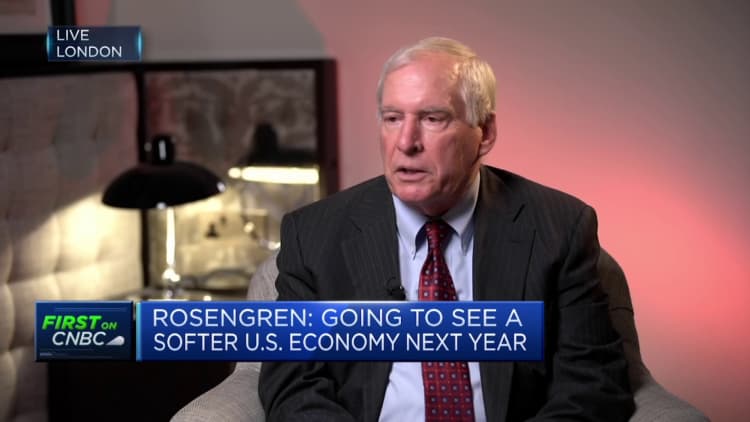
A U.S. recession is "quite likely" next year as persistent inflationary pressures force the Federal Reserve to shift interest rates higher than expected, former Boston Federal Reserve President Eric Rosengren said Tuesday.
Rosengren told CNBC that the U.S. central bank now looked likely to increase its terminal policy rate — the level at which it will stop raising interest rates — to more than the 5% forecast by investors, pushing the economy into a mild downturn in 2023.
"I think it's quite likely the U.S. has a mild recession next year," Rosengren told CNBC's Joumanna Bercetche at a UBS conference in London.
Asked to put a figure on the possible terminal rate, Rosengren said: "More than 5.5% would be my expectation."
The Fed, at its latest policy meeting last week, raised interest rates by 75 basis points to a target rate of 3.75%-4%, and hinted that rate rises could go further than previously outlined, albeit at a slower pace.
Following the announcement, traders bet the terminal rate would reach 5.09% by May from just over 5% before the meeting.
If we go into a recession, it means we're going to be more reliant on monetary policy easing.Eric Rosengrenformer president, Boston Federal Reserve
However, Rosengren, who retired from his post last year, said his elevated rate prediction — based on both Fed forecasts and his own calculations — was contingent on a weakening of the U.S. labor market and a slowdown in nominal wage growth.
For interest rates to peak at 5.5% next year, Rosenberg said the unemployment rate would likely need to hit 5%-5.5%, up from 3.7% today and above the Fed's 4.4% forecast.
The U.S. labor market has remained persistently tight over recent months, putting upward pressure on wages. Wage growth rose 5.2% annually in October, well above the 3.5% that would be consistent with the Fed's goal of returning inflation to 2%, according to Rosengren.
"You're going to need that to get the wage growth down to be consistent with the 2% inflation rate they need," he said.
Midterms in focus
The Fed's efforts to get a handle on soaring inflation, which remained stubbornly high at 8.2% in September, could be further complicated by the results of Tuesday's midterm elections.
If a Republican win proves accurate, Rosengren said that could pile the pressure on the Fed to alter its course if the U.S. economy did enter a downturn.
"If we go into a recession, it means we're going to be more reliant on monetary policy easing because you're not going to have the fiscal stimulus package you might otherwise have," Rosengren said.
"The challenge will be if the economy starts to go down, how comfortable the Fed is given that fiscal policy's not likely to react to a weakening labor market," he added.


